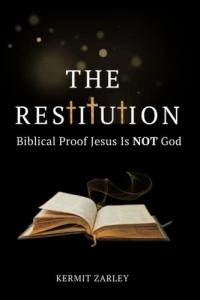 My next book is just about ready for publication. It is entitled The Gospel Corrupted: When Jesus Was Made God. It is a very easy read of about 100 pages. It is about how church fathers changed the gospel and thereby corrupted it.
My next book is just about ready for publication. It is entitled The Gospel Corrupted: When Jesus Was Made God. It is a very easy read of about 100 pages. It is about how church fathers changed the gospel and thereby corrupted it.
I’ve planned this new book as a primer for my book, The Restitution: Biblical Proof Jesus Is NOT God. It is now available at amazon.com. It is 570 pages and cites the writings of over 400 scholars. Except for 100 pages of history of church Christology, it is a detailed examination of the major biblical texts that Trinitarian scholars cite to support their belief that Jesus is man and God, the Second Person of the Trinity.
This book has the following blurbs by New Testament professors on the back cover: Dr. James Tabor (“a mortal wound to the doctrine of the Trinity. … a towering work that will stand for a long time to come”); Sir Anthony Buzzard (“needs to be read by every pastor in the land. … a tour de force. … extensive documentation”); Dr. Scot McKnight (“No one can read this book without being challenged”).
Both books tell about how the post-apostolic, institutional church declared that Jesus was both man and God. This was problematic at the time since the church also claimed there is only one true God, as Jews believed. Thus, the church was pressed to explain how that was not two Gods/gods. During a period of about 250 years, the Catholic Church tried to avoid this allegation by developing what it called “the doctrine of the Trinity.” Today, it is commonly explained in English as follows: God is one essence consisting of three co-equal and co-eternal Persons: Father, Son (Jesus Christ), and Holy Spirit. Trinitarians, as they are called, assert that their doctrine affirms that God is one. Yet critics, including Jews and Muslims, allege that this teaching presents three Gods/gods.
The Restitution relates details about how the church developed this teaching. What distinguishes these two books is that The Gospel Corrupted focuses more on two things: (1) my personal story of how I was a Trinitarian for 22 years and read myself out of that in the Bible, and (2) what the gospel, “the good news,” is in the New Testament and how church fathers later changed it without divine authorization.
I had been taught that Jesus claimed to be God. When I first questioned this, I started my investigation over forty years ago by reading only the sayings of Jesus in the four New Testament gospels, looking for a statement in which Jesus claimed to be God. I was shocked to learn that Jesus never said anything of the sort. In fact, he constantly distinguished himself from the God of Israel, whom he often called “Father.”
Some Christians think Jesus indicated indirectly that he was God by saying, “I and the Father are one” (John 10.30). But they take this saying out of its context. Jesus had been talking about how he and the Father worked together and thus were unified in their missions (vv. 25-29). Many Christians overlook this and think Jesus’ Jewish interlocutors were correct in their accusation, “you, though only a human being, are making yourself God” (v. 33 NRSV). But Jesus refuted this accusation by citing a scripture and presenting a denial (vv. 34-35). Then he said he had only said during his itinerant ministry, “I am God’s Son” (v. 36). Finally, Jesus explained what he meant in v. 30 by explaining, “the Father is in me and I am in the Father” (v. 38). This oneness merely indicates their unification in purpose.
The main reason most Christians have believed Jesus is both man and God is that Jesus admitted he is the Son of God. But they have misunderstood what this means. They have wrongly applied Greek metaphysics to it by reasoning that if a man has a son who becomes a man, God’s Son must also be God. But that idea is not in the Bible. Instead, Jesus being the Son of God should be understood by how that expression is used in the Old Testament. Therein, it is applied to angels, men, and the king of Israel, all with the meaning that God favors them, not that they are Gods/gods. This is what was meant at Jesus’ baptism when a voice from above said, “This is my Son, the Beloved, with whom I am well pleased” (Mt 3.17 par.). Jesus therefore was God’s Son par excellence.
After Jesus’ death, resurrection, and heavenly exaltation, his disciples went about evangelizing the world. The book of Acts tells much about this. It records twenty-four evangelistic sermons, or portions and summaries thereof, that inform people how to be saved. Yet there is nothing in these messages about Jesus being God. It seems impossible that there could be such omission if Jesus’ disciples had been preaching such a notion. If they had, they would have encountered much more opposition from their Jewish brethren about it than for only claiming, as they did, that Jesus was Israel’s Messiah whom God raised from the dead.
Yet in succeeding centuries the church proclaimed otherwise. At the so-called First Ecumenical Church Council, held at Nicea in 325, the Catholic Church drafted the Nicene Creed. It declares that Jesus was “true God of true God.” The constitution of the Holy Spirit was not discussed. But in the 370s, “the three Cappadocians”—who were churchmen and theologians—designated the Holy Spirit as a person (Greek hypostasis) and developed their teaching of the Trinity. It was sanctioned officially by the Catholic Church at its Second Ecumenical Council, held at Constantinople in 381. Then, at the Fifth Ecumenical Council, held at Chalcedon in 451, the Church claimed Jesus has two natures: a human nature and a divine nature which it called “the hypostatic union.” It and “the doctrine the Trinity” prevailed for more than a millennium until the Reformation.
If Jesus is not God, and God is a single person, whom Jesus called “the Father,” how could church fathers have gotten this important issue so wrong? Here’s how. The gospel spread from Israel into the Roman Empire. Soon, most Christians were Gentiles. All church fathers were Gentiles living in a Hellenistic age influenced somewhat by Greek philosophy. Plus, Judaism and Christianity had a “parting of the ways.” Some church fathers became rather anti-Semitic. So, they rejected what Jews believed, including that God is numerically “one” as in their Shema.
Jewish Christianity existed early and into the fourth century. But the Catholic Church, called “the great church,” marginalized Jewish Christians. It largely deemed them heretical and destroyed the literature they produced. Jewish Christianity consisted of two sects: Ebionites and Nazarenes. Both groups believed Jesus was sinless, Israel’s Messiah, and that he died an atoning death, arose from the dead, and ascended to heaven where he awaits his return. The Catholic Church agreed with all of this. But these Jewish Christians claimed Jesus was not God. That is what so divided them from the Church. The Ebionites were more schismatic, many of them rejecting Jesus’ virgin birth, whereas the Nazarenes affirmed it. And the Nazarenes insisted that their forebears were those “Nazarenes” mentioned in the book of Acts (Acts 24.5). Of course, they went by this name because their Lord was called “Jesus the Nazarene” (2.22; 3.6; 4.10; 22.8).
Centuries later came the Protestant Reformation. Those Reformers failed to critically examine the Catholic Church’s doctrine of the Trinity. In my book The Restitution I state, “As for the theological development within the Protestant Reformation, in its early years its leaders were mostly occupied with the accuracy of certain soteriological Catholic doctrines, e.g., justification and absolution (with its monetary indulgences), which had developed during medieval times. The slogan of the Protestant Reformation was sola scriptura (Latin meaning “only Scripture”).
Ironically, the Reformers failed to scrutinize the Catholic doctrine of the Trinity and therefore its corollary, the deity of Christ, in light of Scripture. Martin Luther (1483-1546), the founder of the Protestant Reformation, objected to using the word “trinity,” rightly asserting it is non-biblical; yet he fully-embraced the traditional doctrine of the Trinity with its two-nature Christology. In fact, Luther once wrote unabashedly, “I know of no other God except the one called Jesus Christ.”
I originally published my Restitution book with a pseudonym—Servetus the Evangelical. Michael Servetus was born to a devout Catholic family. He was a brilliant medical doctor and theologian. He questioned his church’s doctrine of the Trinity and wrote two books refuting it. That caused John Calvin to herald the Catholic Inquisitors to arrest him. Servetus was then condemned by the state as a blasphemer for teaching against infant baptism and Trinitarianism and burned at the stake.
In my book I also reveal, “Historian and Unitarian, Earl Morse Wilbur, has been recognized as the foremost authority on Servetus. He concludes that Michael Servetus unwittingly influenced the direction the Protestant movement took regarding Trinitarianism. Wilbur relates that until Servetus’ first publication, ‘it had not been quite clear what attitude the newly reformed part of Christendom would finally take toward the traditional trinitarian dogma.’ Wilbur provides the following examples to show that ‘the leaders of Protestant thought were plainly wavering about it, in view of its lack of clear scriptural support.’[1]
- Calvin disapproved of the Athanasian Creed and even slighted the Nicene Creed.
- Zwingli and others were quite unsound in their exposition of the Trinity.
- Melanchthon earlier ignored Trinitarianism, deeming it unessential to salvation.[2]
“Melanchthon is a prime example of how the early Reformers changed. He wrote a friend about the Reformers’ subsequent carte blanche acceptance of Trinitarianism and divulged, ‘I have always feared that serious difficulties would one day arise.’”[3]
“Wilbur therefore suggests that, given time, the Reformers might have critically examined the Trinitarian teaching and dismissed it as biblically unsound. He continues, ‘The outbreak of Servetus interfered with all of this; and in the face of the Catholic criticism which the Reformers still feared might have such serious results for their movement, they made haste to assert their orthodoxy on this point.’”[4]
Servetus’ condemnation and execution caused a firestorm of opposition, igniting Enlightenment and helping to create Unitarianism in Europe. A lawyer named Faustus Socinus started the Unitarian Movement with the Bible truth that God is a single individual. He assessed Jesus as God only “by office, not nature.” But he rendered Jesus’ death only as an example for us, thus not an atonement for our sins. Yet Socinus strongly affirmed Jesus’ resurrection and his future second coming. While Unitarians were strongly anti-Trinitarian, they advocated even more for the principle of religious toleration since it was so non-existent in Europe. Due to this, today’s Unitarians are liberal-minded, united with Universalists, and cannot be regarded as Christian in accordance with the New Testament.
Then along came “the quest for the historical Jesus.” Most of these critical-historical scholars were rationalists who distinguished “the Jesus of history and the Christ of faith.” The former they designated as the Jesus who can be discovered by applying principles of historical analysis. The church’s proclamation of Jesus they called “the Christ of faith.” They rightly concluded the real Jesus of history was not God. However, the church was right in identifying Jesus as a virgin-born Savior and Israel’s Messiah who arose from the dead since that is clearly what the NT says. Most historical-critical scholars dismissed all of this. This Jesus Quest is still ongoing.
In recent decades, a small movement has arisen that has associated itself somewhat with the original Socinians/Unitarians. Many of these folks call themselves Biblical Unitarians, Christian Monotheists, or the like. They differ, however, from the early Unitarians by rightly affirming Jesus’ atoning death as a necessary element for people to believe to receive God’s forgiveness of their sins, his salvation, and thus the promise of eternal life.
Sometimes, I have encountered people who respond to my One God belief by saying, “That’s been tried before, and look how it turned out,” or something like that. They refer to the old Unitarianism and its eventual liberal demise. But I maintain that this new unitarian movement is doctrinally more sound than the old one and better prepared to support itself biblically.
What value is there in believing that Jesus is Savior and Lord, but not God. First, all people should want to believe what is the truth and thus not error. We should strive to discover the real Jesus of history to believe in, thus not a somewhat fictional Jesus. Second, although Jesus is the archetypal man as God intended humans to be when he created them, and God chose and sent Jesus to be the Savior of those who believe in him, and God made Jesus Lord of Creation which will be consummated at the eschaton, God the Father is still The Almighty to whom all should bow and worship as the one and only true and living God. Third, if we Christians do not realize that Jesus was a man and not God, we cannot properly grasp what a marvelous and joyous accomplishment he achieved in overcoming the temptations of Satan, the flesh, and this world, to provide so great salvation available to us all.
[1] The Two Treatises of Servetus on the Trinity in The Harvard Theological Studies, tr. Earl Morse Wilbur (1932; repr. New York: Kraus, 1969), xvi-xvii. See also Earl Morse Wilbur, Our Unitarian Heritage: An Introduction to the History of the Unitarian Movement (Boston: Beacon, 1925), 40-42.
[2] The Two Treatises of Servetus on the Trinity, xvii.
[3] Cited from Philip Schaff, History of the Christian Church, 8:719.
[4] The Two Treatises of Servetus on the Trinity, xvii. Wilbur relates that Calvin endorsed it in a full treatment in his Institutes of the Christian Religion; Melanchthon, later in his Loci, made it absolutely essential for salvation; and all subsequent Protestant confessions unequivocally included it.













